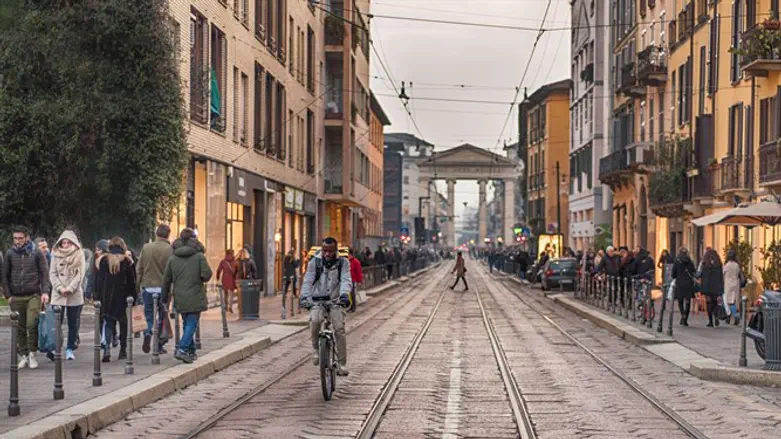
Rabbi Sender Wilschansky, a member of Chabad of Milan's management, spoke to Arutz Sheva about the Italian law being used to forcefully close the Chabad synagogue in the city.
The law, passed a decade ago in northern Italy, aims to prevent the construction of additional mosques in cities, and requires among other things 250 parking spaces for each religious institution.
Rabbi Wilschansky explained that Italy is currently fighting the spread of Islam.
"We're talking about the Lombardy region in northern Italy," he explained. "They're fighting Islam more forcefully. They passed laws intended to limit the spread of Islam by preventing the opening of mosques. You can't really prevent the construction of mosques, so they passed a law allowing the construction of religious buildings, but along with other crazy laws as well, so that no one would construct anything."
"For instance, you have to have 250 parking spaces beside every religious building. Where will you find space for 250 parking spaces in the center of the city? They figured no one would build churches. They have too many. And mosques won't be built. The ones who fell between the cracks are the synagogues, who no one thought of."
Rabbi WIlschansky noted that the vast majority of synagogues aren't listed as religious buildings, other than the central synagogue and another one or two. Those synagogues now find themselves in trouble, because their neighbors don't want religious buildings near their homes, demanding that they keep to the legal standards regarding sharing space or leave the area.
The first hearing for the case is scheduled for October, and Rabbi Wischansky explained that after a discussion with the attorney representing the Chabad synagogue, it was decided that everything should be done in order to avoid court entirely. For this reason, Chabad has decided to leave the building without being told, and to move to another, bigger, nicer, building which was purchased a few years ago.
Explaining the decision, Rabbi Wilschansky said, "It's not clear what's better: If we win or if we lose. According to the lawyer, and we believe this as well, the synagogue is not supposed to be the subject of a court hearing, and it's not supposed to be dependent on a judge's decision. If we lose, we'll have to leave anyways. And if we win, we'll cause the Muslims to understand that there are ways around the law, and they'll do the same. We don't know what's worse, so we came to the conclusion that we need to leave the area before the first hearing."
"Our lawyer told us that we have a chance at winning the case, because we can say that it's a Jewish place with no outward signs, and it's not defined as a religious building. The synagogue is essentially a Chabad House, where we have farbrengens (hasidic gatherings), children's events, and so on. On the other hand, he said that it could be we won't win, and others will learn from it. He's the one who noted that it could be we'll win the battle but lose the war.
"We have bad news, and that's the fact that we have a problem in the first place. The good news is that we purchased a bigger building a few years ago, but we need a few weeks of constant work and 300,000 euro. We hope that we'll be able to amass the sum before October 1, so that we can show the judge that we're ready to complete he Chabad House, and tell him that we're leaving and he should give us a month to be out of the building."
When asked whether having to leave the synagogue, change how the building is defined, not hang any Jewish symbols outside , and avoid court remind him of the periods of anti-Semitism, Rabbi Wilschansky described the situation as "absurd."
"It just shows how absurd this is," he said. "These laws were meant for our benefit. They're better for Jews than for anyone else, and if we have to pay a price and not call [it] a synagogue but a cultural center with no outward signs - symbols aren't a must, it's a low price. We're facing a rare instance in which the law which is supposed to be for our good and block our enemies suddenly turned against us."